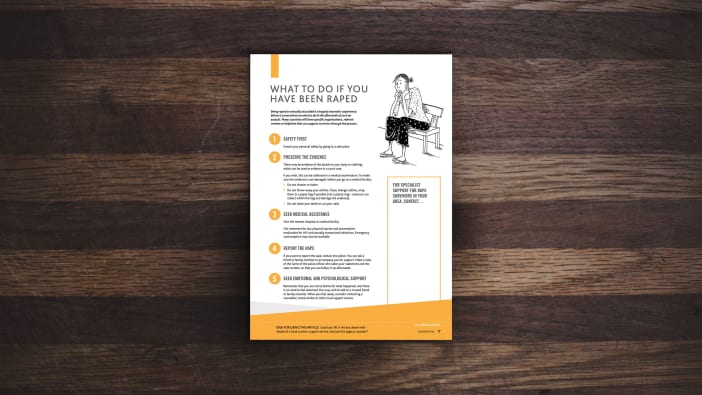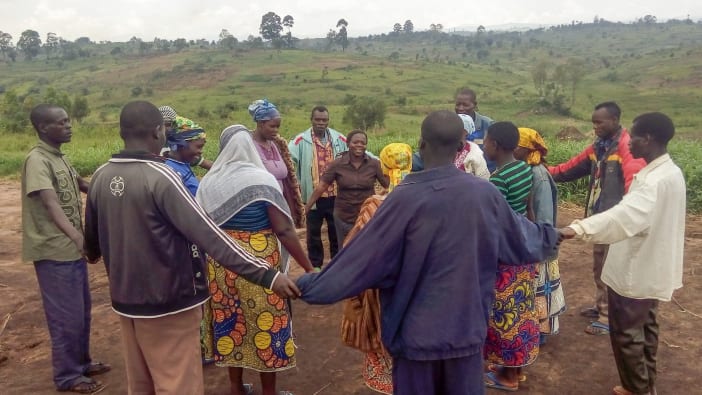In remote regions such as eastern Democratic Republic of Congo (DRC), survivors of sexual and gender-based violence (SGBV) often struggle to access support. They may be unaware of the services available, and facilities such as health centres may be far away. Tearfund and its partners have started Community Action Groups to help solve this problem.
Community Action Groups (CAGs) are made up of around 10–15 people who come together to help individual survivors. Members might include community leaders, health workers, faith leaders, school teachers and trusted police staff. Ideally there should be equal numbers of male and female members. Tearfund and its partners train the members on SGBV, ways of supporting survivors and the local services available.
The group meets regularly to deal with cases of survivors from their community. Sometimes a survivor may contact the CAG herself, but often the members hear about the case through the community and offer support. The CAG forms an individual plan for each survivor. For example, they might arrange referrals to health care facilities and accompany survivors if they wish, or help the survivor’s family to understand what has happened.
One CAG was particularly successful because the local army chaplain joined and played an important role in educating police and army staff. Like most CAGs set up by Tearfund in DRC, the group is still active years after the funding for it came to an end.
Discussion question
- Could you form a Community Action Group to help survivors of SGBV in your area? What resources and training would you need, and how would you publicise the group’s services?
For more information on CAGs, email Elena Bezzolato, Tearfund’s Programme Coordinator for SGBV in Humanitarian Response: [email protected]
Case study: From rejection to new life
My name is Ariane* and I live in North Kivu, DRC. I was 14 years old when, one afternoon, I was alone at home and a man forced himself into our home and raped me. I was hurt, confused and in pain. I could not understand what had happened. My family reacted very badly and was ashamed of what had happened to me.
Their reaction was to reject me and throw me out of our family home. Fortunately, an old relative took me in and offered me shelter. As weeks went by, people in our village started to talk and point their fingers at me. They said I was pregnant. I was 14; I did not know.
This is when the Community Action Group (CAG) met with me and took me to the local health centre, where I received care and support. The CAG members did not stop there. They kept taking me to the health centre for check-ups, advised me and acted as mediators between my family and me.
Change did not happen overnight, but after a few weeks my family understood and accepted what they were told by the CAG members. They took me back home and supported me through my pregnancy.
The CAG members continued to support me, offering advice and encouraging me to go back to school. I did go back to school and finished my diploma, allowing me now to teach in one of the local schools.
The CAG also intervened in our church, where I was welcomed back into fellowship. It is in this very church that I met the man who is now my husband. I am now a married woman with a healthy seven-year-old son.
I can safely say that my life would not be what it is now had it not been for the Community Action Group members and their support. I want to thank them. They are my family. I will never forget them and I plan to stay in touch with each of them.
*Name has been changed to protect identity.
Ending domestic abuse: a pack for churches
The charity Restored has produced an information pack to enable churches to address domestic abuse more effectively. It includes guidance on how to recognise domestic abuse, ways the church can respond and theological reflections.
Available in English, French, Portuguese, Spanish, Hindi, Russian and Swedish. Visit www.restoredrelationships.org/churchpack to download a free copy.








